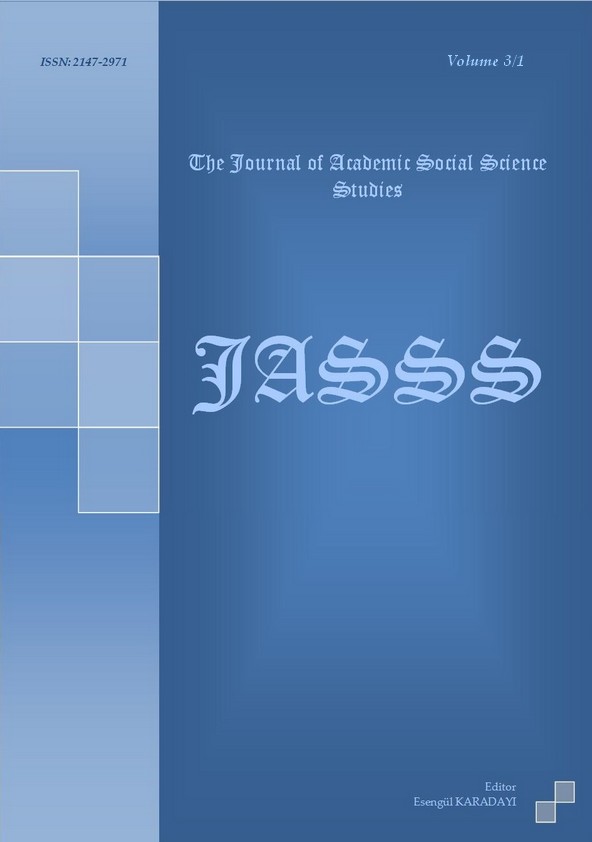Author :
Abstract
Eski çağlardan beri “ giyim, giysi ” anlamıyla kullanılmış olup bugün de çoğu Türk lehçe ve şivesinde “ giysi, kürk, gocuk ” anlamlarıyla geçen “don ” kelimesi, bilhassa Türkiye Türkçesinde anlam daralmasına ve anlam kötülenmesine uğramıştır. Kelime, kaynaklarda belirtildiğinin aksine Sakaca değil, Türkçedir. (Sakaların Türk olma ihtimali de yüksektir.) Düşüncemize göre ton ~ don kelimesi tolamak ( dolamak, çevirmek, sarmak ) fiiliyle ilgilidir. Çeşitli Türk şive ve ağızlarında dola- ~ tola- fiilinden yapılmış, “don ”la aynı ana anlama dayalı pek çok türev görülmektedir: tolak “ dolak, sargı, başörtüsü ”; tolama (dolama) “ sarık, mintan, gömlek, entari, eteklik, önlük, peştemal, örtü ” tola- ~ dola- fiiliyle to- ~ tu- ( tıkamak, örtmek, kapatmak, engel olmak, sed çekmek) kökü arasında bağ kurulabilir. Bugün çeşitli şive ve ağızlarda to- ~ tu- köküne bağlayabileceğimiz, ton ~ don ’la anlam yakınlığı olan pek çok türev görülüyor: tor ( tor) “ ağ, tuzak, seyrek örgülü bir tür dokuma, başörtüsü, peştemal, fanila ”; torluk ~ turluk “ kıl çadır, çoban kulübesi, çadır örtüsü, keçi ağılı”; torlamak “ bir kalkan türü ”; torlak “ sargı, dolak, şalvar ”, tura “ kalkan, siper ”; dok “ keten bez ”; dol “ sığır derisinden yapılan torba ”; dulak “ peçe ”; tuluk “ tulum, kadın giysisi ”, dulda “ saye, himaye ”; tulu “ duvak, perde ”; tuman ~ toman “ don, şalvar, eteklik ”; tugulga ~ tulga ~ tolga, “ çelik başlık, miğfer, örtü ”; duş “ kuytu ”; tun “ fırın kapağı ”, tum “ arı kovanının kapağı” to- ~ tu- kökünün -l- ’li, -n-’li,–z- ’li, - t-’li; tu-l-, tu-n-, tu-z –, tu-t- fiil gövdeleri de mevcuttur ve bu gövdelerden de isimler yapılmıştır, söz konusu olan ton kelimesi ise fiil köküne gelen -n eki ile oluşmuştur.
Keywords
Abstract
From ancient times the word “don ” has been connoted “clothing, costume” and in many Turkish dialects and accents it still means “costume, fur, duffle coat ”, especially in Turkey Turkish it has received to be disparaged and narrowed meaning. It is not a Saka word, on the contrary of the resources it is a Turkish word.(Most probably Sakas were Turkish) In our opinion the word ton ~ don related to the verb tolamak ( to curl, to surround, to wrap-to invade).In various Turkish accents and dialects there are a lot of derivations of the word “don” which leaning against the same meaning with “don”: tolak “leggings, bandage, scarf ”; tolama (dolama) “ turban, shirt, dress-gown, skirt, apron, loincloth, blanket”. The verb tola- ~ dola- can be connected with the root to- ~ tu- “to plug, to cover, to close, to bind, to put a stop to). Today in various dialects and accents there are lots of derivations of that we could connect to to- ~ tu- root which have close meaning with ton ~ don: tor ( tor) “ fish net, trap, a kind of cellular weaving, scarf, loincloth, flannel”; torluk ~ turluk “bristle tent, shepherd cottage, tent fabric, goat cattleguard”; torlamak “ a kind of shield ”; torlak “bandage, leggings, baggy trousers”; tura “shield, barricade; dok “linen cloth”; dol “bag that made of beef skin”; dulak “veil”; tuluk “overalls, dress”; dulda “shade, guard”; tulu “bridal veil, curtain”; tuman ~ toman “pants, baggy trousers, skirt”; tugulga ~ tulga ~ tolga “steel helmet, casque, blanket ”; duş “ quiet and secluded ”; tun “ cover of a furnace ”, tum “cover of a beehive ” There are -l-, -n-,–z-, - t-; tu-l-, tu-n-, tu-z –, tu-t- verb bodies of to- ~ tu- root and nouns has been derivated from these bodies, the word ton, which is point at issue, has been formed by adding –n suffix to the verb root.





